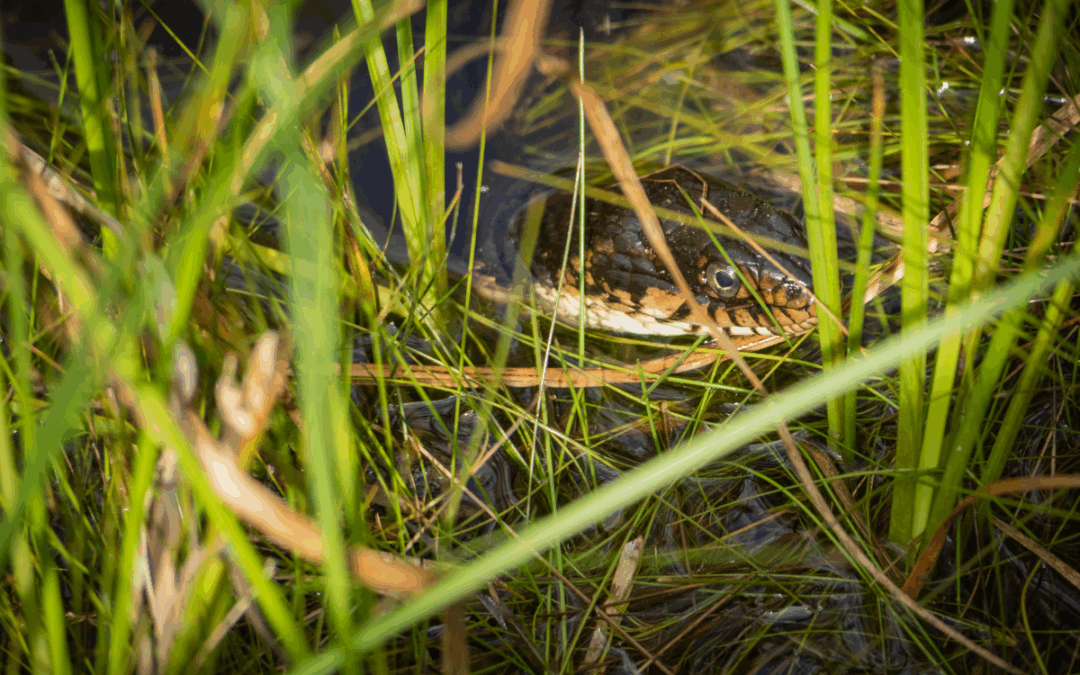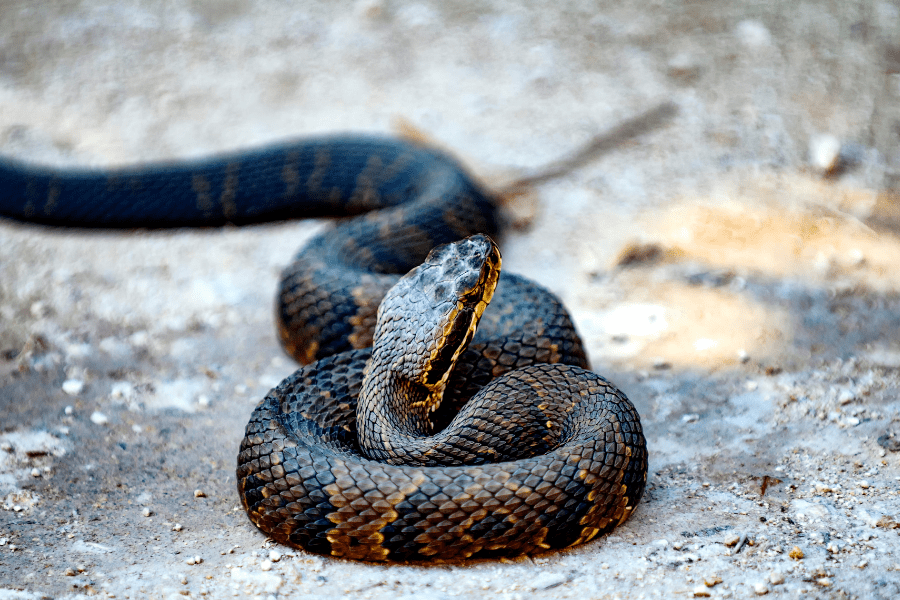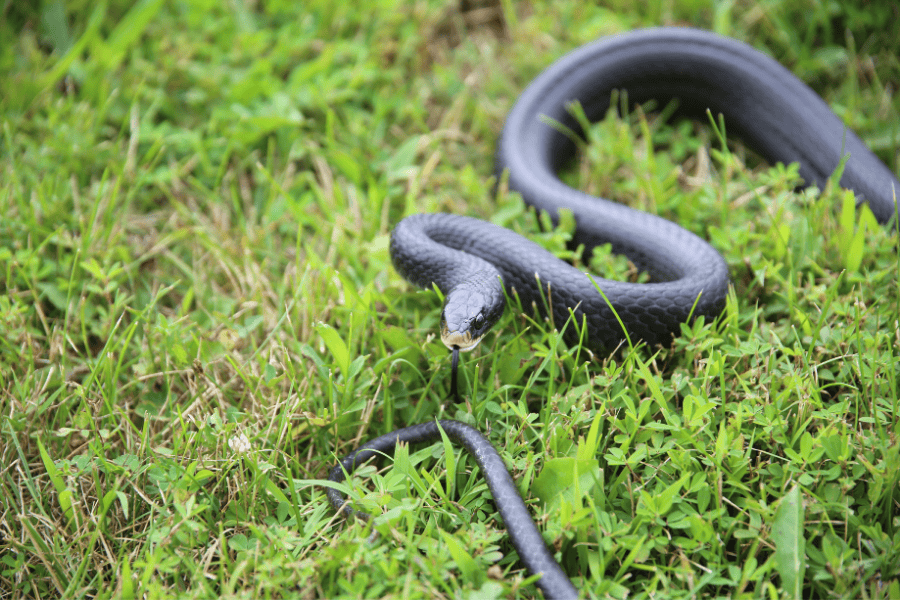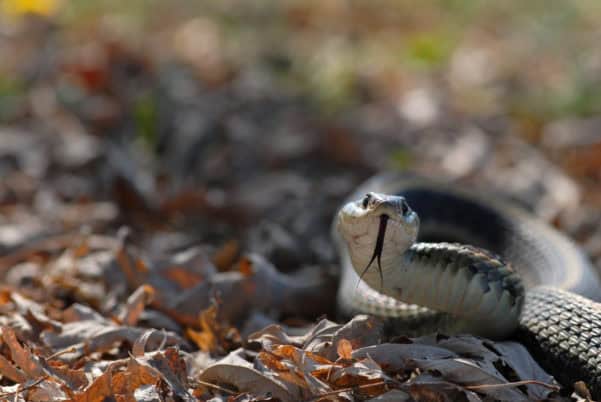READY TO GET STARTED?
REQUEST A FREE ESTIMATE
Fill out the form below or call (888) 466-7849 for a free, no-obligation estimate.

Florida’s warm climate and diverse ecosystems create habitats for over 46 snake species, making encounters a normal part of life. While most are harmless, six venomous species live here, making it important to know which ones pose risks and how to identify them. Education, prevention, and knowing how to respond are key. By understanding snake behavior, recognizing warning signs, and using proven prevention strategies, you can protect your family from Florida snakes while respecting these important members of Florida’s ecosystem.
Florida’s largest venomous snake can grow up to eight feet. Recognizable by diamond-shaped patterns and a rattling tail, they inhabit pine flatwoods, scrub areas, and coastal regions. Their venom is powerful, but these snakes usually avoid people unless threatened.
Often found in swamps, marshes, and lakeshores, cottonmouths have dark bodies and a white mouth interior. Unlike many snakes, they may hold their ground when approached. Their venom can cause significant tissue damage.
Coral snakes have bright red, yellow, and black bands. Remember: red touches yellow, kills a fellow to distinguish them from non-venomous lookalikes. Secretive by nature, they prefer sandy soils and wooded areas. Their venom affects the nervous system.
Found in northern Florida, copperheads have copper-colored bodies with hourglass-shaped crossbands. While their venom is rarely fatal with treatment, it can cause pain and swelling.
Timber rattlesnakes live in northern forests, while pygmies are found statewide. Both have rattles, though pygmy rattles are faint. Venom can cause serious complications without treatment.
Wetlands, pine flatwoods, scrub areas, and hardwood hammocks provide shelter for many species. Cottonmouths thrive near water, while coral snakes prefer sandy or wooded areas.
Yards with ponds, irrigation systems, or dense vegetation can attract snakes and their prey. Brush piles, woodpiles, and overgrown plants provide ideal hiding spots. Garages, sheds, and crawl spaces also offer shelter.
Venomous snakes may have triangular heads, vertical pupils, and heat-sensing pits, though these traits can be misleading. Instead, learn the distinct patterns and colors of dangerous species.
Rattlesnakes shake their tails to warn intruders, cottonmouths show their white mouths, and most snakes retreat if given the chance. Striking is typically a last resort.
Keep grass trimmed, remove brush piles, and maintain a clear perimeter around the home. This reduces shelter for both snakes and the small animals they hunt.
Seal gaps under doors, cracks in foundations, and utility entry points. Use hardware cloth barriers under porches or decks. Fix leaks and eliminate standing water to discourage both snakes and their prey.
Stay calm and slowly back away. Never try to catch or kill a venomous species. Give it space to escape.
Call 911 or go to the nearest emergency room immediately. Never attempt to capture the snake, as this is unnecessary and could result in another bite. Remove jewelry and tight clothing from the affected area, and keep the person as still as possible until help arrives.
Florida’s snakes play a vital role in controlling pests and maintaining ecological balance. Learning how to identify species, modify your property, and respond appropriately will help you coexist with these reptiles. If you’re unsure whether a snake is venomous or how to handle an encounter, a trained snake removal expert can provide proper identification and humane removal. Contact us today for a free snake removal quote!

Tennessee’s picturesque landscapes are a joy to live in, filled with rolling hills, lush greenery, and thriving wildlife. But with all this natural beauty comes one thing every homeowner dreads encountering too close to home: snakes. While most snakes you’ll find here are harmless and even beneficial as natural pest controllers, you probably don’t want them turning your home into their habitat. Fortunately, there are simple, effective ways to keep snakes out of your living spaces. Follow these practical tips to snake-proof your Tennessee home and enjoy peace of mind.
Snakes are experts at finding their way inside through even the smallest openings. Cracks as narrow as a quarter inch can become their point of entry, so it’s crucial to inspect your home and seal gaps thoroughly.
Securing these entry points doesn’t just deter snakes; it also prevents insects and rodents from getting inside.
Your yard can unintentionally invite snakes if it offers prime hiding spots. Snakes are drawn to areas where they can safely rest and hunt prey. Keeping your outdoor space tidy goes a long way toward making your property unappealing to these slithering creatures.
A clutter-free and well-maintained yard sends a clear message to snakes that they won’t find a cozy home here.
Reducing the food supply makes your property far less appealing for hungry snakes.
Cool, dark spaces like garages, sheds, and crawlspaces are highly attractive to snakes. Without proper precautions, these areas can become their go-to hideaways.
Regular inspections of these areas can help catch any issues before they escalate.
Snake-proofing your Tennessee home doesn’t have to be overwhelming. Simple steps like sealing entry points, clearing yard clutter, removing food sources, and securing storage areas can make a big difference. And if snakes keep showing up, calling a wildlife services or pest control company near you can give you the expert support—and peace of mind—you need.

South Florida’s warm climate and lush landscapes make it the perfect habitat for a wide range of wildlife—including snakes. While most snakes you may encounter are harmless, a few dangerous snakes, such as water moccasins or coral snakes, can pose serious threats to people and pets. So what should you do if you come across a snake in your yard? And who should you call to get rid of it? Let’s explore the best steps to take when dealing with unwanted slithering visitors—and how professional snake removal can keep your home safe.
First things first: don’t panic. Whether it’s venomous or not, any snake that feels threatened can become defensive and strike. If you spot a snake:
Stay calm and keep your distance
Do not attempt to touch, trap, or kill the snake
Keep children and pets indoors
Note the snake’s size, color, and behavior (from a safe distance)
Trying to handle a snake yourself is dangerous and can result in injury. Many homeowners aren’t equipped to determine whether a snake is venomous or not—so it’s best to leave identification and removal to the experts.
If you need snake removal near you in South Florida, call a licensed snake pest control company that specializes in wildlife removal. Professional snake removal services will:
Safely capture and relocate the snake
Identify the species (especially important for venomous snake sightings)
Inspect your property for potential entry points
Recommend preventative measures for long-term snake control
Snakes often enter yards in search of food, water, or shelter. If your property has overgrown grass, open sheds, debris piles, or rodent activity, it could be attracting snakes without you even realizing it.
Attempting to remove a snake on your own is not only risky—it could also be illegal in some cases. Professional snake removal services use humane, legal methods to handle snakes safely and protect native species. They’ll also help you seal up entry points and provide tips to prevent future encounters with these slithery guests.
If you’ve spotted a snake around your home, don’t take any chances. Our trained technicians offer fast, safe, and effective snake removal services throughout South Florida. Whether you’re dealing with a venomous snake or just want peace of mind, we’re here to help with expert snake control solutions.
Contact us today for professional snake removal near you! Let us help you take back your yard—safely and quickly.

Georgia is home to a wide variety of snake species, both venomous and non-venomous. While most snakes play a vital role in the ecosystem by controlling rodent populations, their presence in and around homes can be unsettling. Understanding snake behavior, knowing what to do if you encounter one, and exploring snake pest control options can help you manage and prevent unwanted snake encounters.
Georgia has over 40 snake species, with only a few being venomous. Knowing the difference can help you determine whether a snake poses a danger.
Encountering a snake can be alarming, but staying calm is crucial. Here’s what you should do:
Many people wonder, “Can pest control get rid of snakes?” While traditional pest control focuses on insects and rodents, some wildlife control companies specialize in snake removal. These services include:
To prevent snakes from entering your property, consider the following snake control strategies:
Snakes are drawn to areas with ample food. Reducing rodents, insects, and bird eggs in your yard can deter them.
Snakes can enter homes through tiny gaps. Seal cracks, holes, and vents with mesh or caulk to prevent entry.
There are natural and commercial snake repellents available, including:
If you frequently see snakes on your property or inside your home, it’s time to call a wildlife control company. Professional snake removal services ensure:
Snakes are an essential part of Georgia’s ecosystem, but they can be a nuisance when they invade homes and yards. By identifying common snake species, knowing what to do if you encounter one, and implementing snake pest control strategies, you can minimize encounters. If you have persistent snake problems, a professional wildlife control company can provide safe and effective snake removal solutions.
For expert assistance in handling snakes on your property, contact a trusted pest control company specializing in snake control and wildlife removal.

Florida’s beautiful landscapes are home to a wide range of wildlife—including many different types of snakes. While most Florida snake species are harmless and even helpful in controlling pests, spotting one too close to your home can be unsettling. That’s when knowing who to call for snake removal near you becomes important.
Whether you’re looking to identify snakes, prevent them from entering your yard, or deal with an unwanted visitor, this guide covers what you need to know about snake control in South Florida.
Understanding which snakes you might encounter can help you respond appropriately—especially when deciding if professional snake removal services are necessary.
Small and non-venomous, garter snakes have stripes along their bodies and are commonly found in gardens and wooded areas. These snakes pose no threat to humans.
Fast-moving and sleek, these snakes are often seen darting across yards and open fields. Although they may startle you, they’re not venomous and typically flee when approached.
With its distinctive red, yellow, and black banding, this venomous snake is one of Florida’s most dangerous. Coral snakes are reclusive and prefer wooded areas with sandy soil.
Rare in South Florida but worth noting, copperheads have a copper-colored head and hourglass pattern. These snakes are venomous and usually hide near water or under debris.
Large and non-venomous, black pine snakes have dark bodies and light bellies. They favor sandy, forested habitats and help control rodent populations.
While spotting an occasional snake isn’t unusual, you can reduce the chances of them hanging around your home with a few simple strategies:
Snakes love places to hide—tall grass, brush piles, and cluttered landscaping. Mow regularly, trim overgrown bushes, and clear out debris to make your yard less inviting.
Snakes can squeeze through surprisingly small openings. Inspect your fencing and home for gaps or holes, and consider burying your fence a few inches underground to prevent snakes from slithering underneath.
Rodents and insects attract snakes. Keep pet food, bird seed, and trash sealed tightly, and use rodent control measures as needed to eliminate a primary food source.
Certain plants, like marigolds, lemongrass, and garlic, can deter snakes due to their strong scent. Add these to your landscape for a natural line of defense.
Standing water draws insects and amphibians, which in turn lure snakes. Ensure your yard has proper drainage and eliminate any areas where water collects unnecessarily.
Bright lights attract bugs—and bugs attract snakes. Opt for motion-sensor lighting to reduce nighttime insect activity while still keeping your yard safe.
If you discover a snake on your property:
Stay calm and back away slowly
Do not try to trap or kill the snake
Keep pets and children at a safe distance
Call a professional for snake removal near you
Many snakes in Florida are protected, and attempting to remove them yourself—especially dangerous snakes like coral snakes or copperheads—can result in serious injury or legal issues. Let experienced snake pest control experts handle the situation.
If you’re noticing frequent snake activity or suspect a nest nearby, it’s time to call in snake removal services. Wildlife professionals will not only safely remove the snake but also inspect your property, seal up potential entry points, and help create a long-term snake control plan.
Snakes are an important part of our ecosystem—but that doesn’t mean you want them too close to home. If you’re worried about snakes in your yard or home, don’t wait. Our licensed wildlife team offers professional, humane, and reliable snake removal near you in South Florida.
Contact us today to schedule an inspection and get peace of mind with expert snake control services.